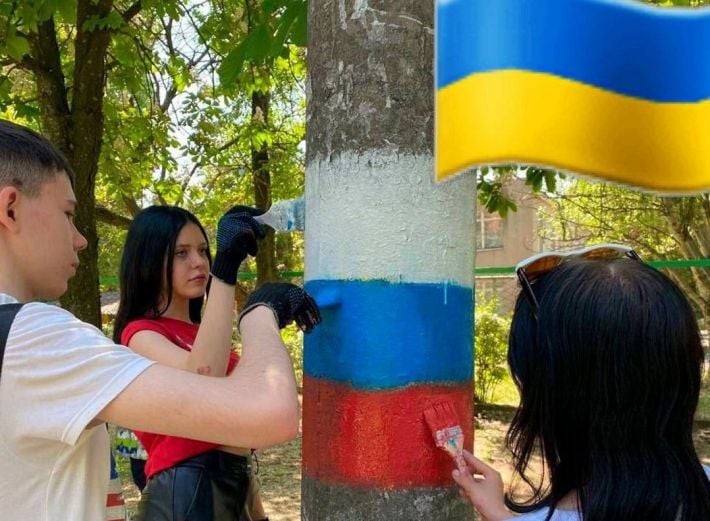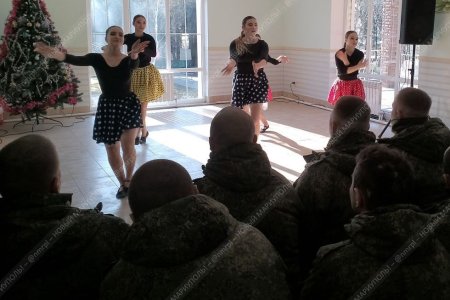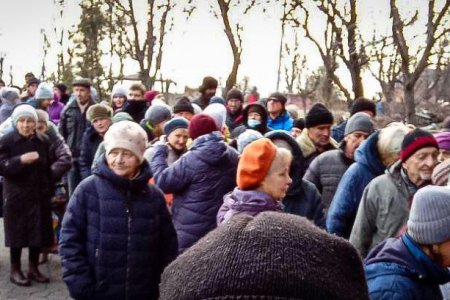
One of the recurring lies in the narrative used to justify Russia’s invasion of Crimea and parts of Donbas was the supposed ‘discrimination of Russian-speakers’ in those areas. The lie is especially brazen given that Russia has removed the Ukrainian language from schools, the media and all public life in every part of Ukraine that it has occupied. The speed with which it axed Ukrainian makes it clear that this was always the plan. Criticism of the inclusion of English language in the curriculum may be more a reaction to the West’s sanctions over Russia’s war of aggression against Ukraine, but is, nonetheless, alarming.
On 18 May, at a meeting (of the council of the Collective Security Treaty Organization) in Minsk (Belarus), Viacheslav Volodin, speaker of Russia’s State Duma claimed that English is a “dead language” whose time has passed. He proposed teaching “national languages, the languages of international communication, Chinese” instead. Volodin may have been primarily trying to flatter and woo China, but he is not the first Russian or Russian-installed politician who has proposed removing the study of English and linked the use of Russian with ‘patriotism’. In May 2022, Russian-installed speaker of the occupation Crimean parliament Vladimir Konstantinov used almost the same words in proposing to exclude English from the school curriculum. He too claimed that children would instead learn “our own languages”. Shortly afterwards, Petr Tolstoy, deputy speaker of the State Duma railed against anglicisms in the language, and claimed that in in order that children “grow up patriots of their own country”, there needs to be what he calls “a single language realm”
It is worth viewing those utterances against the background of Russia’s aggression and occupation of parts of Ukraine. On any Ukrainian territory which Russia has seized since 2014, it has immediately begun removing the Ukrainian language from education on occupied territory and has initiated propaganda measures particularly aimed at indoctrinating children and young people.
Volodin’s talk about ‘learning national languages’ seems especially hypocritical as even those languages spoken in parts of the Russian Federation are increasingly taught as optional, and limited, extras, as ‘foreign languages’, not as the children’s language of communication.
In occupied Crimea, the supposed existence of three state languages – Ukrainian, Crimean Tatar and Russian – is on paper alone. Russia has been ignoring a UN International Court of Justice ruling since 2017 and the situation with access to education in Ukrainian has fallen to a critically low level. The situation is only marginally better with access to education in Crimean Tatar.
Before its full-scale invasion of Ukraine in February 2022, Russia continued to present its proxy ‘Donetsk and Luhansk people’s republics’ as autonomous entities. By 2020, the Ukrainian language had been ‘officially’ removed from all schools in the so-called ‘Luhansk republic’, while the ‘Donetsk republic’ had removed Ukrainian as an official language.
At the end of March, RIA Melitopol reported that the occupation regime in Melitopol (Zaporizhzhia oblast) had held a meeting at which they informed teachers of Ukrainian language and literature that they were “no longer needed”. The teachers would be allowed to work till the end of the school year, and then made redundant. RIA Melitopol cites a Melitopol resident who said that when the kids say that they want to study Ukrainian, they’re told that their native language is Russian, and get asked if they’re not “waiters” – a word the invaders use for those on occupied territory who are longing for liberation by the Ukrainian Armed Forces. The threat would be clear – if not to the children, then to their parents. On any territory that falls under Russian occupation, it is dangerous to demonstrate commitment to ones Ukrainian identity, including the Ukrainian language. Earlier in March, RIA Melitopol published a form which the occupiers handed out to parents. On it they had to provide all details identifying themselves, before filling it which “native language” they would like their children to study ‘Native language’ and ‘Native literature’ in. “With such a level of ‘anonymity’, RIA Melitopol adds, it’s hardly difficult to guess what language the parents ‘will choose’. There can be no choice, if writing Ukrainian means you will have to answer to the invaders.
Russia has encountered considerable resistance from both teachers and parents in occupied parts of Zaporizhzhia and Kherson oblast. With Ukrainian teachers refusing to collaborate with the invaders, Russia tried bringing in teachers from Dagestan, almost certainly by offering them more money than they could hope to earn at home. They also got them to produce propaganda videos in which they pretended to be horrified by the level of education in the occupied territory, specifically their supposedly poor knowledge of the invaders’ language.
The occupation regime has also increasingly turned to other forms of terror by, for example, threatening to take children from their parents if the latter do not send them to occupation ‘schools’. Similar threats are also being applied to force parents into taking on Russian citizenship.
In March, Ivan Fedorov, Mayor of Melitopol, stated that dozens of school students were continuing studies according to the Ukrainian syllabus, either as external students or following family programs, He explained that they could not study online, as it was simply too dangerous, with the Russians likely at any moment to carry out raids or searches and react with repression if they find evidence of such programs on phones and other devices. Fedorov reported, for example, that a woman had been ‘deported’, together with her children, because the invaders discovered that the children were studying according to the Ukrainian syllabus. Parents had ended up summoned to the Russian military command if the invaders found evidence of such programs in their phones or those of their children.
All of these methods have been applied in any area while it was under Russian occupation, with schools used more as platforms for pro-Russian propaganda, than as places of education. Such policy is aimed at denial and obliteration of all aspects of Ukrainian identity, and demonstrates the real, essentially genocidal, nature of Russia’s war of aggression against Ukraine.



